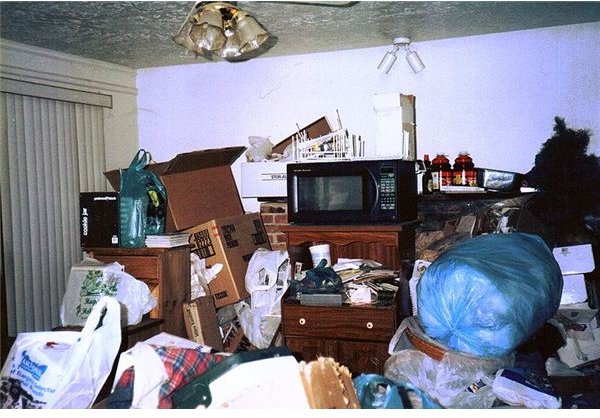How Hoarding Can Be Extremely Detrimental To Family Life
The concept of hoarding has become a very popular topic more recently as it appears on up and coming shows such as “Clean House” and “Hoarders: Buried Alive”. While hoarding is not an actual diagnosis found in the DSM Diagnostic and Statistical Manual for Mental Disorders, it is a very serious behavior which can alter a person’s life as well as disrupt the family. Hoarding can be extremely detrimental to family life.
Unnatural Surroundings
Imagine how you feel when there is not enough time in the day to get everything done and you simply cannot “straighten up” the last few knick knacks around the house. Now imagine walking into a family member’s house and you can barely move around. There may be a collection of old newspapers on the floor, a vast amount of collectibles lying around, and in general “unnecessary” junk all over the place. To many people this scene may be a frightening one, but to hoarders it seems quite natural.
Now imagine actually having to live with this hoarder. Behaviors which you may have once seen as a little peculiar now seem totally abnormal as your spouse, parent, or maybe even your child has become what many call a “pack rat”. Can people actually live this way in a healthy manner or will the “junk” one day hit the fan?
The Family:
An intact family is made up of individuals who function as a whole. Many things can disturb and even stress out a family such as a death or a divorce. The family must figure out how to adjust or treat the new issue at hand. A family member who has hoarding behaviors can put a crack in the family which can ultimately break the unit in pieces.
Living in a house consumed with clutter can make a person not only emotionally or mentally unwell but also physically ill. A few knick knacks which turn into clutter will eventually turn into dust collectors. These “dust collectors” have many times turned into bacteria collectors. How can one be healthy and live in this setting? You can’t. This is why the family members of hoarders will try to get the sufferer help.
Treating A Hoarder:
Hoarding is a difficult symptom to treat because many times the person who suffers from hoarding characteristics does not believe that they have a “problem”. They do not see the detrimental effect it is having on themselves or their families and friends. A person who is a hoarder finds comfort in their “collections” and if they are taken away, the hoarder will begin to collect again to fill an emotional void. Hoarding has become a coping skill.
Two types of treatment that have enjoyed successful outcomes for hoarders are cognitive behavioral therapy and medications. (Mayo Federation for Medical Education and Research, 2009).
Treatment:
Cognitive Behavioral Therapy:
Cognitive behavioral therapy (CBT) aims to change the patient’s maladaptive thought patterns (cognitive) into healthier thought patterns. This change will then in turn change the maladaptive patient’s actions (behavior). Some CBT factors used by a mental health professional will include:
- Relaxation methods such as breathing or counting to help the patient attain healthier coping mechanisms.
- Investigation of feelings and thoughts as to why the patient may feel the need to hoard.
- Visits to patient to help de-clutter home.
Medications:
While research is still being carried out on hoarding, researchers have found that selective serotonin reuptake inhibitors (SSRIs) have been shown to be effective when treating hoarding symptoms. These antidepressants are also normally used for obsessive compulsive disorder, which seems to have many similarities to hoarding.
Conclusion:
Many people who suffer from hoarding behaviors do not believe that anything is wrong with their “collections”. They may see their lives as quite normal while their families and friends may actually find the hoarding to be abnormal. Families can reach out to the person who is hoarding and help them to see what they are doing is not only hurting the hoarder but also hurting their relationships.
The hoarder needs to be shown that hoarding can be extremely detrimental to family life. Unfortunately, some hoarders do not see this until it is too late and continue hoarding to the point that their family moves out. If a family comes to this point, the hoarder still can be saved. They may even have their own self revelation when they see how badly they may have hurt their loved ones.
References:
Mayo Federation for Medical Education and Research. (2009). Hoarding. Retrieved from, https://www.mayoclinic.com/health/hoarding/DS00966
Neziroglu, F., Slavin, J., Donnelly, K. (2010). How compulsive hoarding affects families. Retrieved from, https://www.ocfoundation.org/hoarding/family.aspx
Children of Hoarders. (2010). COH: Finally talking about the family secret. Retrieved from, https://www.childrenofhoarders.com/bindex.php
Image released into the public domain under Creative Commons Attribution License
